Philly’s budget is being reshaped as officials prioritize strategy over despair in financial planning.
As Philadelphia grapples with significant budgetary challenges, local leaders are urged to consider a comprehensive reevaluation of the proposed financial plan. The urgent need for a budget that reflects current realities has arisen amidst drastic cuts to federal funding and ongoing challenges facing civil society. The impact of these changes is not only economic; it has profound implications for various communities across the city.
Historically, there have been instances where the city adjusted its budget mid-process. A notable example occurred in March 2020, as policymakers altered their financial strategy in response to the COVID-19 pandemic. Faced with an unforeseen public health crisis, the mayor and City Council developed a budget that addressed immediate needs and reflected the profound shifts in the local and national landscape. Today, the city once again finds itself in a similarly precarious situation, facing the potential for severe federal funding cuts that threaten the financial stability of many essential programs and services.
The current political climate presents unique challenges that diverge from those experienced during the pandemic, as it is characterized by a lingering crisis affecting urban centers across the nation. Philadelphia, already identified as one of the poorest major cities in the country, is particularly vulnerable. Many programs that support urban communities are at risk, including crucial initiatives aimed at addressing housing, food security, and health care access.
During recent discussions among community leaders, the cumulative effects of these federal cuts were highlighted, showing that many residents may face simultaneous challenges. The anticipated decrease in support for vital services, such as Low Income Home Energy Assistance and SNAP benefits, could lead to increased hardships for families already struggling to make ends meet. In fact, approximately 20% of Philadelphia’s population lives below the poverty line, and the potential consequences of funding cuts could exacerbate already dire circumstances.
Moreover, the possibility of reduced funding for violence intervention programs poses a significant threat to community safety—an issue that often sees an uptick during economic hardship. The interconnectedness of these challenges suggests that a fragmented approach to addressing budgetary issues will not suffice.
The mayor and City Council have a critical opportunity to collaborate with residents and stakeholders to design a budget that is responsive to the needs of the community. Acknowledging the urgency and magnitude of current challenges may pave the way for proactive measures to fortify the city’s social safety net and ensure resources are directed toward the most vulnerable populations.
As Philadelphia continues to navigate these turbulent times, a collective call to action encourages leaders to pause, reassess, and rework the city’s budget. Prioritizing community engagement in this crucial process will be key to ensuring the financial health and social well-being of Philadelphia’s residents in the face of impending challenges.







